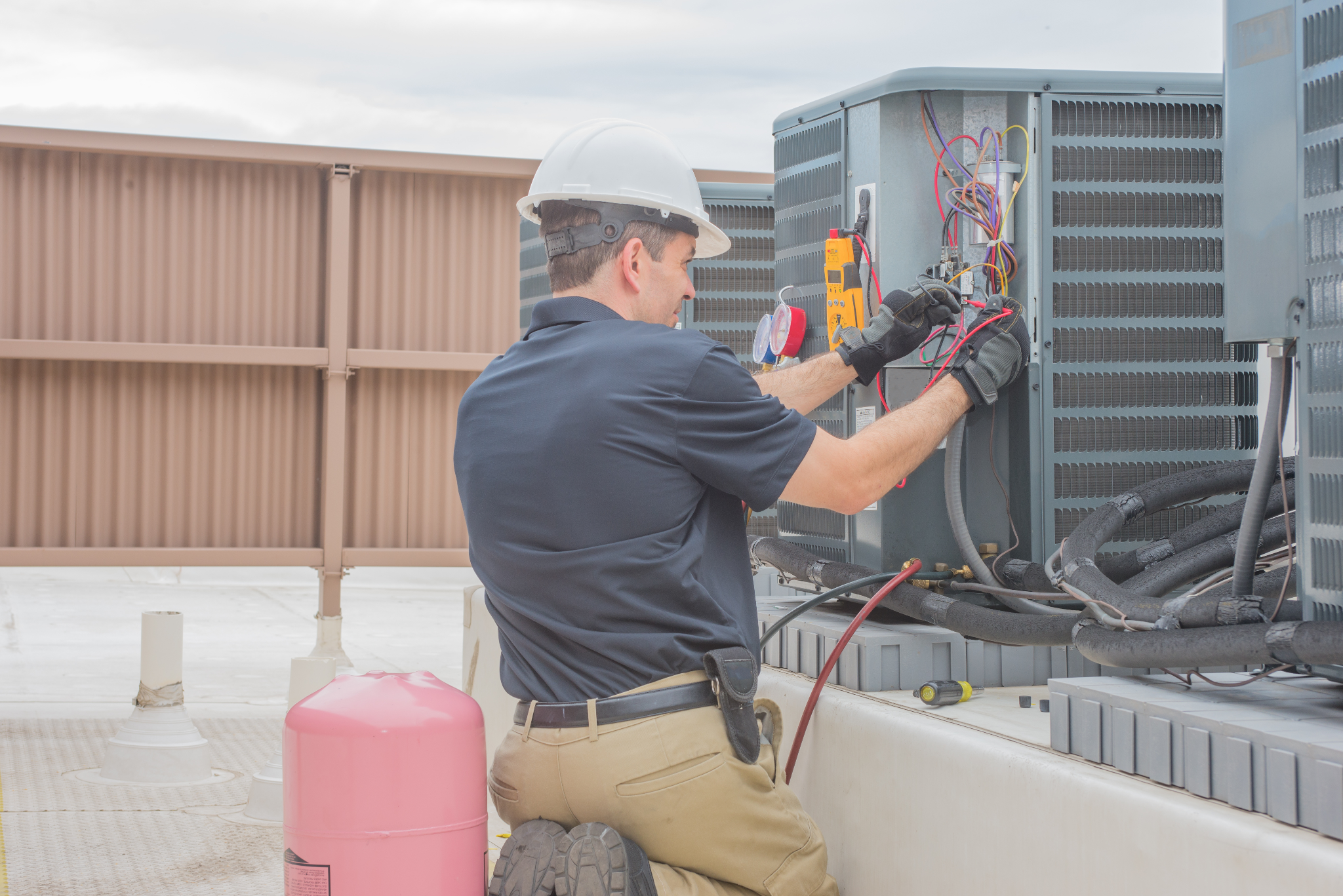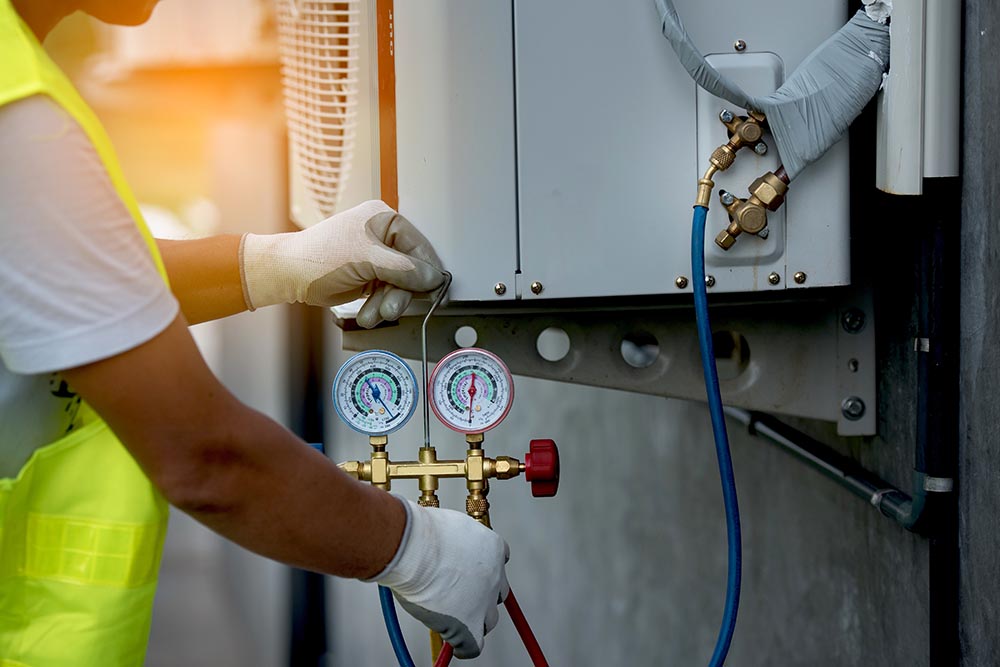heat pump service: What to Expect and Why It Matters
Choosing In Between a Heatpump and Heating System: Secret Considerations for Your A/c Requirements
When assessing heating alternatives for cooling and heating requires, the decision between a heatpump and a furnace can be intricate. Each system offers distinctive advantages tailored to particular climates and power effectiveness goals. Recognizing these distinctions is essential for making an enlightened option. Key variables such as setup prices and ecological impact further make complex the option procedure. Which option absolutely lines up with one's comfort and sustainability choices? The following areas will check out these factors to consider in detail.
Recognizing Heat Pumps: Exactly How They Function and Their Advantages
While many house owners consider various home heating options, comprehending just how warm pumps feature and their advantages can substantially influence their decision. Heatpump operate by transferring heat as opposed to creating it. In the winter months, they extract warm from the outdoors air or ground and move it inside, while in the summer season, they reverse this process, cooling the home by expelling warm outside. This double functionality makes them versatile for year-round climate control.One of the key benefits of warmth pumps is their power performance. They make use of substantially less electricity compared to conventional furnace, possibly resulting in reduced utility expenses (heat pump installation ooltewah tn). In addition, heat pumps have a smaller sized carbon footprint, making them an eco-friendly option. They additionally need much less maintenance than standard systems, contributing to long-term cost savings. On the whole, comprehending the technicians and advantages of warm pumps can help house owners make informed choices regarding their heating and cooling down requirements
Exploring Furnaces: Kinds, Operation, and Advantages
Heaters can be found in various types, including gas, electrical, and oil models, each with unique operational devices. Understanding these differences is crucial, as they impact performance and heating performance. Additionally, furnaces offer numerous benefits, such as consistent heat output and integrity in colder climates.
Sorts of Furnaces
Heating unit can differ substantially in layout and operation, with heaters being a prominent option among house owners. There are numerous sorts of furnaces, each utilizing various gas sources and modern technologies. Gas furnaces are common, leveraging gas to create heat efficiently. Electric heaters, on the various other hand, make use of electrical resistance to create warmth, usually favored for their uncomplicated installment. Oil furnaces, while less usual, work in locations with restricted gas gain access to (heat pump installation ooltewah tn). Additionally, condensing heaters maximize power efficiency by reusing and recording exhaust gases. Each type operates via a system of heat exchangers and ductwork to distribute cozy air throughout a home. Recognizing the distinctions between these heater types is crucial for educated HVAC choices
Advantages of Furnaces
For homeowners seeking reputable heat during cold months, the advantages of furnaces are significant. Furnaces offer constant heating, making sure even temperature levels throughout the home. They are particularly reliable in extreme chilly, usually outshining warmth pumps in icy problems. Numerous types, consisting of gas, electrical, and oil heating systems, supply flexibility to satisfy varied demands and preferences.Furnaces also have a tendency to have reduced first setup prices contrasted to warm pumps, making them an extra available alternative for lots of. Their durable design adds to a much longer life-span, with many systems lasting over 15 years with correct upkeep. Furthermore, contemporary heating systems are commonly equipped with sophisticated innovation for boosted efficiency, which can lead to reduced power costs. On the whole, heaters remain a trustworthy choice for efficient home heating.

Power Efficiency: Contrasting Warmth Pumps and Furnaces
When comparing energy effectiveness between heatpump and heating systems, the Seasonal Energy Performance Proportion (SEER) plays a vital duty in figuring out performance. Furthermore, an operational expense evaluation reveals the long-lasting financial ramifications of each system. Recognizing these elements can assist home owners in making informed decisions regarding their home heating services.
Seasonal Energy Effectiveness Ratio
Energy efficiency plays a vital function in the decision-making procedure between heat pumps and heating systems, particularly when thinking about the Seasonal Energy Performance Ratio (SEER) This metric measures the cooling effectiveness of heatpump over a whole cooling period, providing a standard means to examine efficiency. Greater SEER rankings show better energy performance, converting to reduced power usage and lowered utility costs. On the other hand, heaters are typically assessed using the Annual Gas Utilization Performance (AFUE) score, which mirrors heating performance. When contrasting these 2 systems, home owners ought to focus on SEER rankings for heat pumps, as they directly effect general energy cost savings and environmental sustainability. A complete understanding of SEER can especially affect the lasting complete satisfaction and cost-effectiveness of the chosen a/c solution.
Operational Cost Evaluation
Recognizing the operational expenses connected with heatpump and heating systems is essential for property owners evaluating their choices. Heatpump commonly offer higher power performance, converting electrical power right into warmth with very little waste. This leads see page to reduced month-to-month utility bills, particularly in moderate climates. Conversely, standard heaters, specifically gas versions, might have lower in advance costs however can incur higher functional expenditures in time as a result of fuel rates and efficiency ratings.Moreover, heat pumps can function as both heating and cooling down systems, possibly minimizing the requirement for separate a/c units. While preliminary investments for heatpump may be higher, their long-lasting financial savings in power effectiveness can make them a more cost-efficient choice for many houses. Careful analysis of regional energy rates is necessary to establish the best alternative.
Setup Prices: What to Anticipate for every Furnace
Setup prices for heater can differ considerably between heat pumps and furnaces, affecting homeowners' choices. Heatpump normally have greater in advance installation prices, usually ranging from $3,500 to $8,000, relying on the unit size and intricacy of installation. This consists of the outside system, interior handling system, and essential ductwork modifications. On the other hand, heating systems often tend to have reduced initial prices, balancing in between $2,500 and $6,000, which can be appealing for budget-conscious house owners. Installment expenditures can boost if extensive ductwork is required.Moreover, the choice of fuel kind for heaters-- natural gas, lp, or electrical-- can straight from the source also affect installation expenses. While heatpump use power effectiveness, their preliminary financial investment may hinder some customers. Inevitably, assessing installment expenses along with lasting savings and effectiveness will assist property owners in making notified choices regarding their heater.
Environment Considerations: Which System Carries Out Much Better in Your Area
Exactly how do environment problems influence the effectiveness of heating unit? The efficiency of warmth pumps and heaters can vary greatly relying on the regional climate. In moderate climates, heatpump stand out by successfully moving heat from the outside air, making them an energy-saving choice. Their efficiency diminishes in exceptionally chilly temperature levels, where they might have a hard time to draw out enough warm. On the other hand, heating systems, specifically gas versions, provide consistent and dependable warm despite exterior conditions, making them preferable in cooler regions.In locations that experience milder winter seasons, heatpump can operate effectively year-round, giving both heating & cooling. In contrast, regions with severe winter seasons commonly gain from the robustness of heating systems. Eventually, comprehending the neighborhood climate is important when choosing in between a warmth pump and a heating system, as it directly affects their functional effectiveness and overall performance.
Upkeep Requirements: Long-Term Look After Warm Pumps vs. Furnaces
While both heatpump and furnaces need routine maintenance to assure peak efficiency, their particular demands and care routines vary considerably. Heating systems normally require much less frequent interest, with yearly assessments being enough to look for gas leakages, tidy filters, and examine total functionality. Their easier design often permits for simple repairs.In contrast, warm pumps necessitate semiannual maintenance because of their double function in heating & cooling. This consists of cleansing coils, checking cooling agent levels, and making sure that both the indoor and outside systems operate at their best. In addition, heatpump upkeep often includes even more intricate elements, making specialist servicing essential.Neglecting maintenance can bring about diminished effectiveness and increased energy expenses for both systems. Inevitably, homeowners must take into consideration these long-term care demands when picking between a heat pump and a heating system, as positive upkeep can expand the lifespan and performance of either system significantly.
Ecological Influence: Selecting a Lasting Heating Alternative
The environmental impact of heater is a vital assessment for homeowners seeking lasting alternatives. Warmth pumps are generally a lot more energy-efficient than conventional heating systems, as they transfer warm instead of generate it, click here for more significantly minimizing carbon exhausts. By using renewable resource sources, such as geothermal or air-source warm pumps, house owners can additionally minimize their environmental footprint.On the other hand, natural gas furnaces give off greenhouse gases and add to air pollution, though they frequently offer higher warmth result. Innovations in innovation have led to the growth of high-efficiency heating systems that reduce emissions.Ultimately, selecting a home heating system includes considering effectiveness against ecological impact. Homeowners are urged to show on local power sources and motivations for renewable systems, making certain a selection that aligns with both individual comfort and ecological responsibility. The choice impacts not just immediate comfort yet likewise long-lasting sustainability and environmental health and wellness.
Regularly Asked Inquiries
How Much Time Do Warmth Pumps and Furnaces Generally Last?
The life expectancy of warmth pumps generally ranges from 15 to two decades, while furnaces can last in between 15 to 30 years. Normal upkeep significantly influences their longevity and effectiveness in providing home heating services.
Can I Utilize a Warm Pump in Very Cold Climates?
Warmth pumps can run in exceptionally cool environments, but their efficiency diminishes as temperature levels decrease. In such problems, supplementary heating resources might be required to keep comfy indoor temperatures and assure peak efficiency.

What Is the Sound Level of Heat Pumps Versus Furnaces?
The sound degrees of heatpump and heating systems differ considerably. Generally, heatpump operate even more quietly than typical heating systems, making them preferable for those conscious sound, while furnaces might create louder operational sounds during heating cycles.
Are Warmth Pumps Suitable for Both Home Heating and Air conditioning?
Warm pumps are without a doubt suitable for both cooling and heating (heat pump installation ooltewah tn). They operate by moving warmth, giving reliable temperature level control year-round, making them a flexible option for property owners looking for an all-in-one heating and cooling option
What Size Heater Do I Need for My Home?
Determining the ideal size furnace for a home calls for evaluating variables such as square video footage, insulation quality, regional climate, and the home's layout. Consulting a professional can guarantee a precise evaluation and perfect convenience. Warmth pumps commonly supply greater power efficiency, converting electrical energy into warm with marginal waste. In modest climates, heat pumps succeed by effectively moving heat from the outdoors air, making them an energy-saving choice. Conversely, heating systems, especially gas versions, give regular and reliable warmth regardless of outside conditions, making them better in cooler regions.In locations that experience milder winters, warm pumps can run efficiently year-round, supplying both home heating and cooling. Heat pumps are generally much more energy-efficient than traditional heating systems, as they move warm instead than create it, significantly minimizing carbon discharges. By utilizing sustainable energy resources, such as geothermal or air-source warmth pumps, house owners can even more lessen their environmental footprint.On the other hand, all-natural gas heating systems produce greenhouse gases and contribute to air pollution, though they commonly supply higher heat outcome.